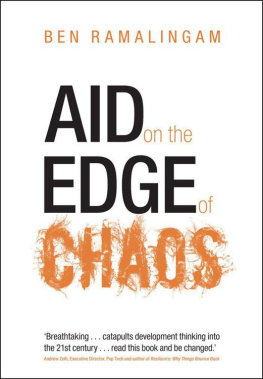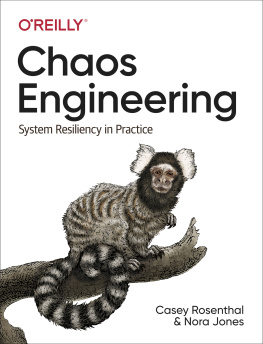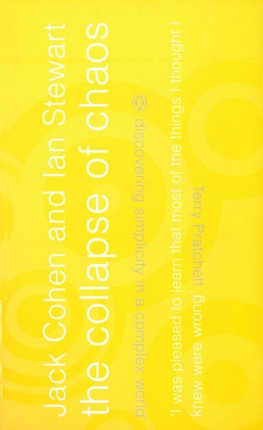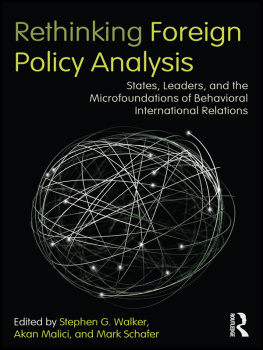PRAISE FOR AID ON THE EDGE OF CHAOS
This masterful book represents an important step towards changing our institutions and organizations: a shift away from outmoded, one-size-fits-all, top-down planning and towards responsive and adaptive innovation. If that were to happen in international development alone, the effects could be profoundbut as Ramalingam implies, this needs to be a part of a much broader change in political and economic thinking. Ramalingam skillfully draws upon a diverse body of ideas and research to deliver a vital message for aid and beyond.
Philip Ball, author of Critical Mass, Winner of the Aventis Royal Society Book of the Year and Consultant Editor, Nature
Aid on the Edge of Chaos will change the way you think about development. Drawing on the latest scientific research into complex adaptive systems, Ben Ramalingam shows that simplifications about economic and social change are not only misleading, they are potentially damaging. This is essential reading for anyone who wants to think seriously about how development happens, and about what can be done to accelerate it. This is one of the most important books you will read about development.
Owen Barder, Senior Fellow, Center for Global Development and former Director, Department for International Development
Alleviating deep and persistent poverty, and creating shared, sustainable prosperity is one of the great challenges of our century. Ben Ramalingams thought-provoking and highly readable book re-frames the debate on aid and development. Drawing on both leading-edge thinking and practical experience from the field, Aid on the Edge of Chaos challenges the existing aid paradigm and points the way towards a genuinely new approacha new approach that is urgently needed.
Eric Beinhocker, Executive Director, Institute for New Economic Thinking at the Oxford Martin School, University of Oxford and author of The Origin of Wealth
Ben Ramalingams tour de force of a book provides an unorthodox and fascinating insight into todays global aid sector: its current practices and sometimes faulty theories of action. Beyond the criticism it manages to explore several avenues on how to unlock the most obstructive problems that are facing the sector. Borrowing from scientific fields generally ignored by the aid industry, Ben Ramalingam also opens up new perspectives on possible humanitarian and development futures. This book is a vital source of inspiration for the ICRC and for the aid community as a whole.
Yves Daccord, Director General, International Committee of the Red Cross (ICRC)
We are all on this small planet together. Ultimately, our fates cannot be separated. In a broad ranging discussion of our global network of mutuality, Ben Ramalingam expertly shows how those in the wealthier countries can best help the severely disadvantaged in this time of massive change and dislocation. Marrying science, policy and practice with a deep moral conscience, this important book points to a future that we should all be working towards.
Peter Doherty, Nobel Laureate, Medicine
In this important book, Ben Ramalingam convincingly shows why transformational change is so badly needed in foreign aid, and where it might come from. In clear and elegant prose, he presents a critique of the status quo, clear explanations of alternative mindsets and ideas, and inspiring stories of innovation from around the world. The result is a book that is a must read for all leaders who areregardless of sectorfinding themselves having to navigate instead of ignore complexity. A wonderful endeavour.
Lynda Gratton, Professor of Management, London Business School, author of Hot Spots: Why Some Teams, Workplaces, and Organisations Buzz with Energyand Others Dont
By bringing together a deep knowledge of both the aid business and complexity theory, Ramalingam shows the insights that come from crossing disciplinary boundaries. This well-written and thought-provoking book is an important contribution to redesigning aid for a messy, complex world.
Duncan Green, Senior Strategic Advisor, Oxfam
Ben Ramalingam is a leading champion of the adaptive, scientific, trial-and-error thinking that the aid industry badly needsweve been eagerly awaiting this book.
Tim Harford, author of The Undercover Economist Strikes Back and Adapt
This excellent book does three important things. It provides an informative tour of the reductionist thinking and over-simplistic approaches that characterise so much current development policy and practice. It draws on the ideas of complex adaptive systems research to show that such flaws are neither inevitable nor incurable. And it presents a series of powerful cases of how these new ideas are beginning to make a real difference to the way we think about and work in aid. A must-read for anyone interested in development, its current discontents, and its future potential.
Ricardo Haussmann, former Chief Economist, Inter-American Development Bank and Director of the Centre for International Development, Harvard University
This is a superb book, boldly facing in this age of globalization the complexity of aid to developing countries. Ben Ramalingam presents lucid exposition and insightful analysis, derived from hundreds of interviews, empirically tested studies, and real-life episodes. His findings make a compelling case to transform aid, from the external push of unrealistic panaceas to internal catalysis that can help recipient societies evolve their own future. Impressive and inspiring, this work is destined to become a 21st century classic.
Dudley Herschbach, Nobel Laureate, Chemistry
Well written and challenging, Ramalingam pushes his reader to question traditional wisdoms, navigate different disciplines, and value the import of local experience. Much needed.
Noreena Hertz, author of Eyes Wide Open: How to Make Smart Decisions in a Confusing World and The Silent Takeover
Aid of the Edge of Chaos is a masterful synthesis of complexity science and the latest thinking about aid and development. With beautifully clear writing and stories, Ben Ramalingam uses complexity concepts to reveal the deep reasons for why aid sometimes worksand sometimes doesnt. Scholars, practitioners, policymakers and students will all benefit considerably from reading this book.
Thomas Homer-Dixon, Director, Waterloo Institute for Complexity and Innovation, author of The Upside of Down
Aid on the Edge of Chaos is an important and insightful book, a work of original and well documented scholarship that is also highly accessible. Fresh thoughts and new ideas bubble on virtually every page. Ramalingam sets out a challenge to researchers and practitioners in international cooperation to rethink our basic assumptions and act in ways that are more attuned to the real world in all its complexities. This is one to read and reread.
Sir Richard Jolly, former Assistant Secretary General, United Nations
This book is essential reading not only for those committed to making aid more effective, but also for those interested more generally in complex systems thinking. It shows the limitations and dangers of simplistic, prescriptive approaches to the highly interconnected, nonlinear systems that characterize so many real-world problems. Far from being a pessimistic funeral march, Ramalingams wide-ranging and scholarly discourse provides many inspiring examples of how complexity theory can be put to practical and meaningful use, and lays out a hopeful path forward.
Next page




